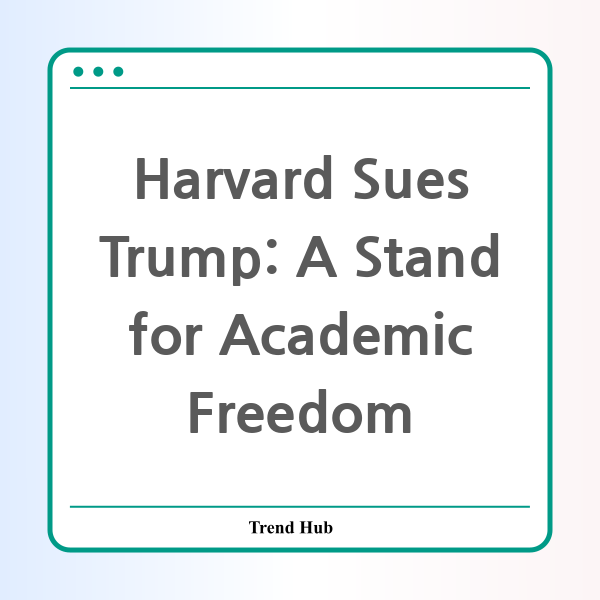* This website participates in the Amazon Affiliate Program and earns from qualifying purchases.

In a bold move that has sent ripples through the higher education landscape, Harvard University has officially filed a lawsuit against the Trump administration. The lawsuit centers around crucial issues related to immigration policies and funding that Harvard claims violate federal law. This legal action represents more than just a fight over funding; it is a significant stand for academic freedom and the independence of American universities.
Harvard argues that the recent policies enacted by the Trump administration have far-reaching implications that could severely affect the university’s ability to attract international students and esteemed faculty members. In an era where cultural and intellectual diversity is more important than ever, the university contends that discriminatory practices must not be tolerated, especially in the realm of education and research.
University President Alan M. Garber expressed grave concerns in a letter addressed to the Harvard community, articulating that the administration’s escalating actions could have "stark real-life consequences for patients, students, faculty, staff, researchers, and the standing of American higher education in the world." This sentiment captures the essence of the university's mission: to foster an environment of learning and a culture of inquiry free from political interference.
At the heart of the lawsuit is the Trump administration's demand for access to all university reports addressing antisemitism and anti-Muslim bias on campus, as part of a broader effort to leverage federal funding to impose its political ideology on elite colleges. Harvard firmly rejected these demands, stating that the government has failed to establish any rational connection between the concerns raised and the research that has been frozen, which is critical to saving American lives and maintaining the country’s global leadership.
As the showdown intensifies, the implications extend beyond just Harvard. Other prestigious institutions, including Princeton, Cornell, and Northwestern, are facing similar pressures, leading to a wider confrontation over academic freedom and institutional autonomy. With the Trump administration hinting at the possibility of freezing billions in federal grants and contracts, the stakes are higher than ever.
Garber, while acknowledging valid concerns regarding antisemitism on campus, emphasized that the university’s task forces are already working to combat intolerance within the community. This lawsuit embodies a powerful message: that universities must hold steadfast to their independence and not succumb to governmental overreach.
Furthermore, the reaction from prominent Harvard alumni has been overwhelmingly supportive of the university’s stance. Massachusetts Governor Maura Healey, a Harvard graduate and a Democrat, criticized the administration’s attempts to revoke the university’s not-for-profit status as "outrageous," further underscoring the collective support for the institution's legal action.
In conclusion, Harvard’s lawsuit against the Trump administration signifies a critical moment in the ongoing battle for academic freedom and institutional integrity. As the government attempts to tighten its grip on higher education, the response from universities like Harvard demonstrates a commitment to uphold their foundational principles. This legal battle will not only shape the future of Harvard but also set precedents for universities across the nation, affirming that education should remain an area free from political machinations.
* This website participates in the Amazon Affiliate Program and earns from qualifying purchases.